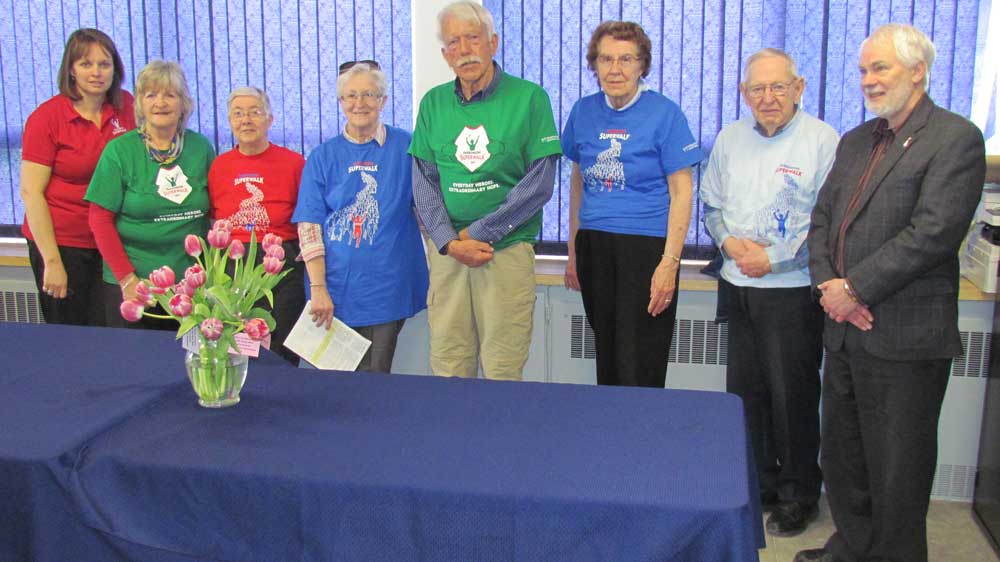by Betty Bardswich
Mindemoya–Central Manitoulin Mayor Richard Stephens attended the monthly meeting for individuals with Parkinson’s Disease (PD) on April 16 and proclaimed April to be Parkinson’s Awareness Month, not only for Central Manitoulin, but for the whole Island as the condition has no boundaries.
As Mayor Stephens noted, Parkinson’s affects nearly 100,000 Canadians including 40,000 people here in Ontario and is a chronic and progressive neurodegenerative disease with no cure. He went on to say that the condition is caused by damage to the flow of dopamine, a chemical that carries signals between the nerves and the brain controlling an individual’s ability to move. His final remarks observed that local people with Parkinson’s and their caregivers rely on Parkinson Society Central and Northern Ontario to provide them with information, resources and support groups to help better manage the physical and psychological effects of this debilitating disease and that these two groups have contributed to approximately $22 million that Parkinson’s Society Canada has invested in more than 425 research projects since 1981 to find better treatment, and ultimately a cure for PD.
The Parkinson’s group here on the Island is among the many throughout Ontario who contribute to the national organization as they hold a Superwalk every year to raise funds. The members meet every month except July and August under the leadership of registered nurse Marilyn Proulx, who is a seniors’ mental health nurse. Family members and caregivers are welcome to attend these meetings which feature a guest speaker at times as well as videos and discussions. The April 16 meeting saw the screening of a video on Deep Brain Stimulation (DBS), a recent advancement in the treatment of Parkinson’s.
DBS is a surgical procedure used to treat the debilitating motor symptoms of PD such as tremors, inflexibility, stiffness and slowed movement and walking. A pulse generator is implanted in the Parkinson’s patient with this procedure which delivers electrical stimulation to areas in the brain that control movement. The generator can be removed if there are side effects or another, better, treatment for PD comes along. As with any surgery, there is some risk to the procedure with a one percent to three percent chance of complications including stroke, infection or cranial bleeding according to the National Parkinson Foundation, but overall, the outcomes are encouraging. Most individuals can greatly reduce their PD medication and there is a considerable reduction in symptoms. The advantages of DBS include the ability to change the electrical stimulation, the fact that DBS can be stopped to allow for other procedures in the future and that the procedure improves quality of life. WebMD reports that over 70 percent of people undergoing this surgery experience a significant improvement of all symptoms related to PD.
Mark Smith of Little Current has had PD for 12 years, which is gradually getting worse thus he is very interested in DBS procedures, including those being done at Western Hospital in Toronto. As he and his wife Rachel explained, they talked to people over the phone who had DBS done and they were encouraged by the successful outcomes. “We have had lots of issues to deal with,” Ms. Smith explained, “There were lots of changes in medications and lack of sleep, stress, colds and flus can upset the medications being taken. Sometimes the drugs don’t always work. There are good days and bad days and you have to come up smiling.”
Ms. Proulx encourages all Islanders with PD, as well as family members and caregivers, to attend the monthly meetings. “That is the purpose of the awareness month,” she explained, “to raise awareness and get people out to the meetings.”
For more information, call 1-800-565-3000




